How to Care for Succulents: Our Ultimate Care & Buying Guide
Wondering how to care for succulents indoors and outside too? We’re sharing our best tips!
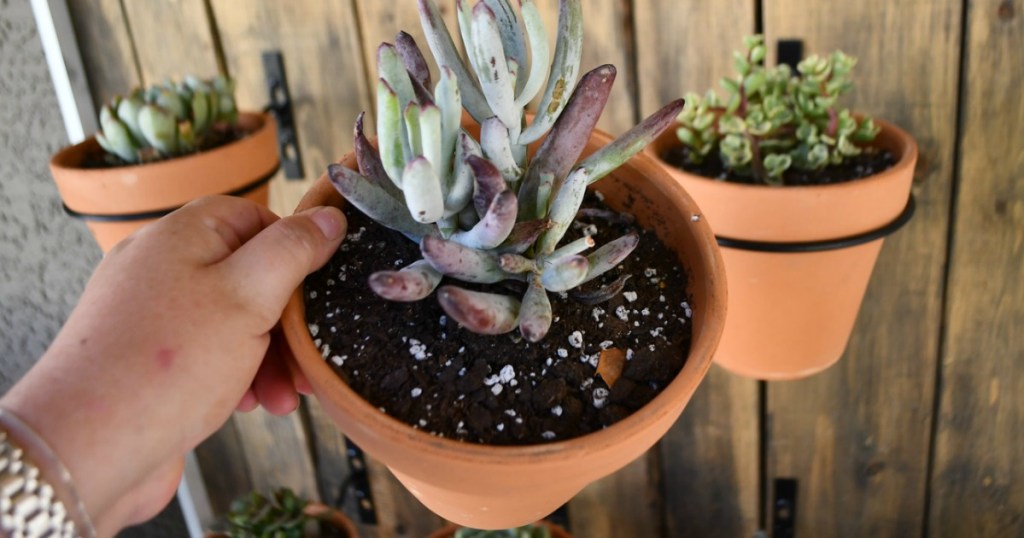
Aspiring plant parents, this one’s for you!
Looking to work that green thumb without a ton of effort? Succulents are about to be your new best friend! These robust plants are a favorite for easy home decor that gives a fresh appeal to any space but don’t require loads of maintenance, and aren’t expensive either!
Keep reading for our best tips on how to care for succulents indoors, how to help them thrive outside, and which ones you should buy. We’re covering everything from succulent care for beginners to strategies for experienced plant parents too!
1. What are succulents?
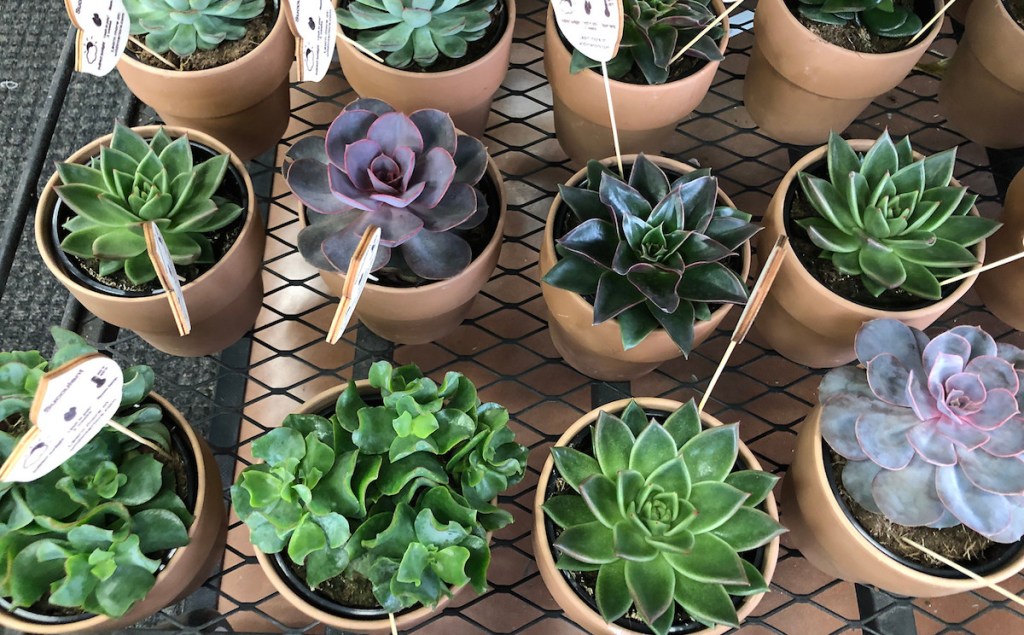
Succulents are amazing plants! Unlike many plants that need to be watered frequently, succulents store water in their leaves, which allows them to go for long periods without being watered.
Their exotic shapes and laid-back vibes are two huge reasons for their popularity! Plus, they come in many shapes, sizes, and colors, providing endless decor options around your home. We love ’em!
2. Do succulents clean the air?
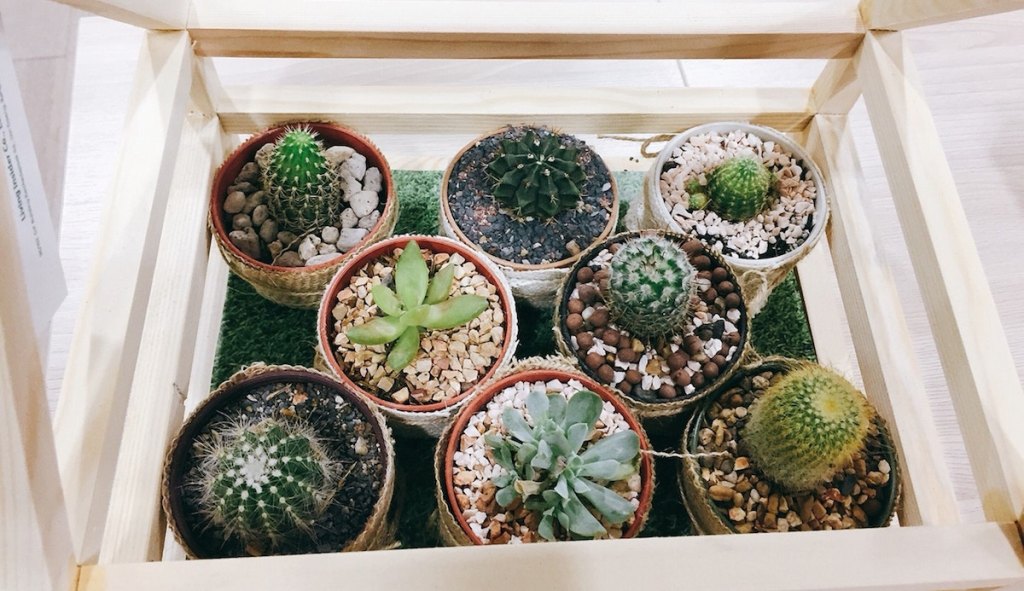
Yes! Succulents are just like any living plant. They use the carbon dioxide that we exhale to produce clean oxygen, which ultimately creates breathable air. Without this process, neither plants nor humans could exist!
When we inhale and exhale, the oxygen in our body releases carbon dioxide, returning the favor for succulents. Talk about a perfect match, huh?
Did you know: The human body is about two-thirds oxygen, which powers vital processes like brain function, blood circulation, breathing, and metabolism?
3. Are succulents perennials or annuals?
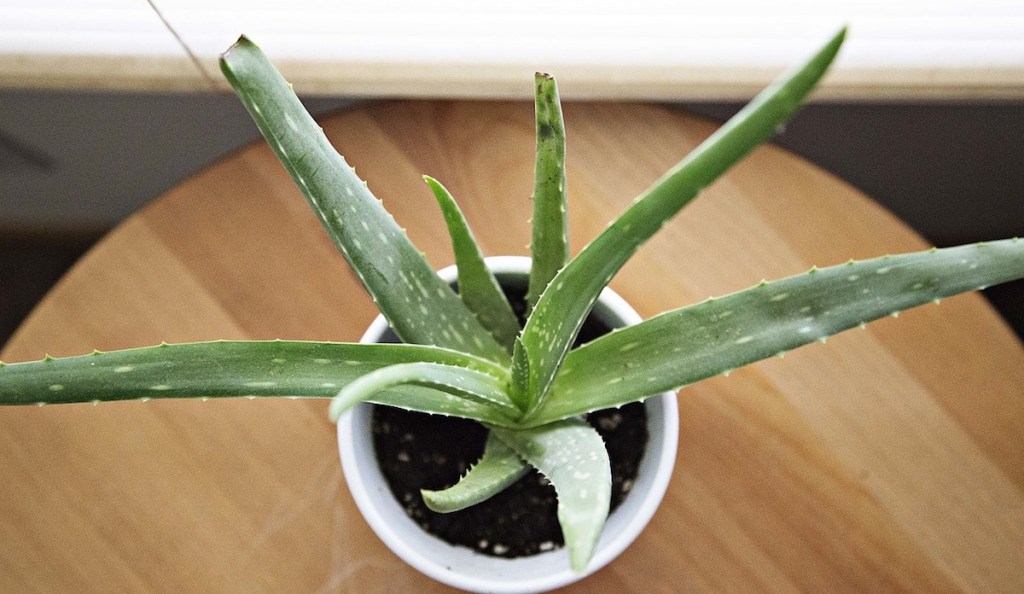
There are two types of plants – annuals and perennials. Annual plants complete their entire life cycle and die within one year. Perennials live for three or more years and typically flower during their second year of growth.
While there are both annual and perennial succulents, perennials are the most common species. Many hardy succulents even go dormant in the winter and can survive the cold and frost, making them ideal for outdoor and indoor gardeners. Some common perennial succulents are Sempervivum, Echeveria, Aloe, and Aeonium—just to name a few!
4. What should I look for when buying a succulent?
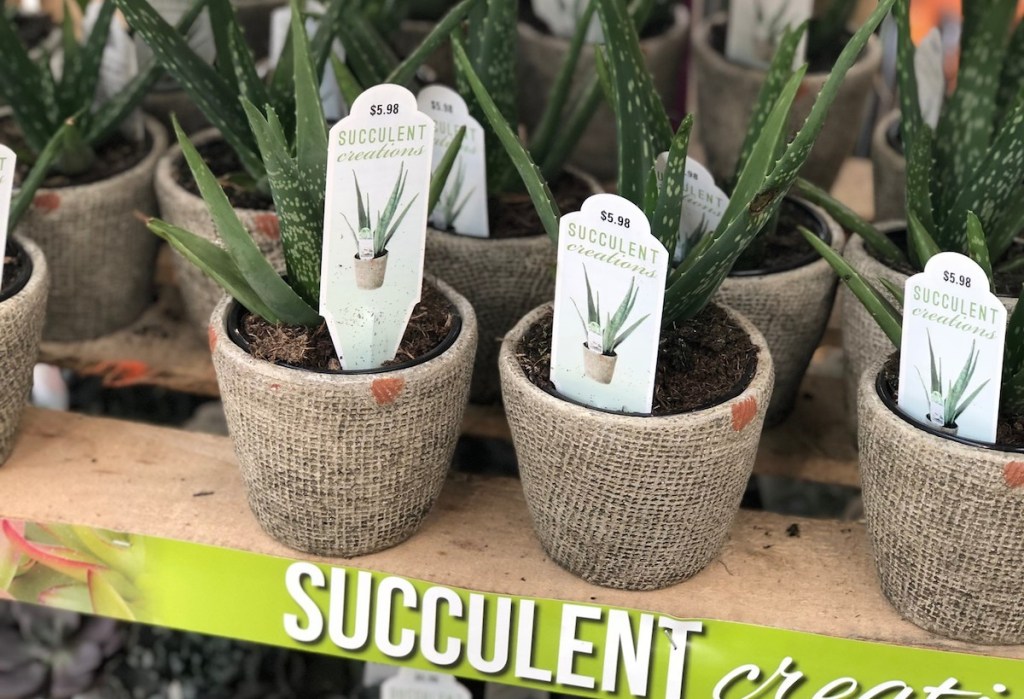
Make sure you get off to a good start with a healthy plant.
- Don’t buy neon-painted cacti or succulents, as the paint isn’t good for the plant.
- Don’t buy succulents glued into rocks in a pot, as the plant won’t be able to spread its roots.
- Don’t buy a plant with a translucent, squishy base or leaves; it might be overwatered or have root rot.
- Don’t buy a succulent with wrinkly-looking leaves because it might be seriously under-watered.
Tiny succulents tend to be the cheapest, but they can take a while to grow. If you want a large succulent immediately, it might be worth shelling out the extra cash!
5. Which soil is best for succulents?
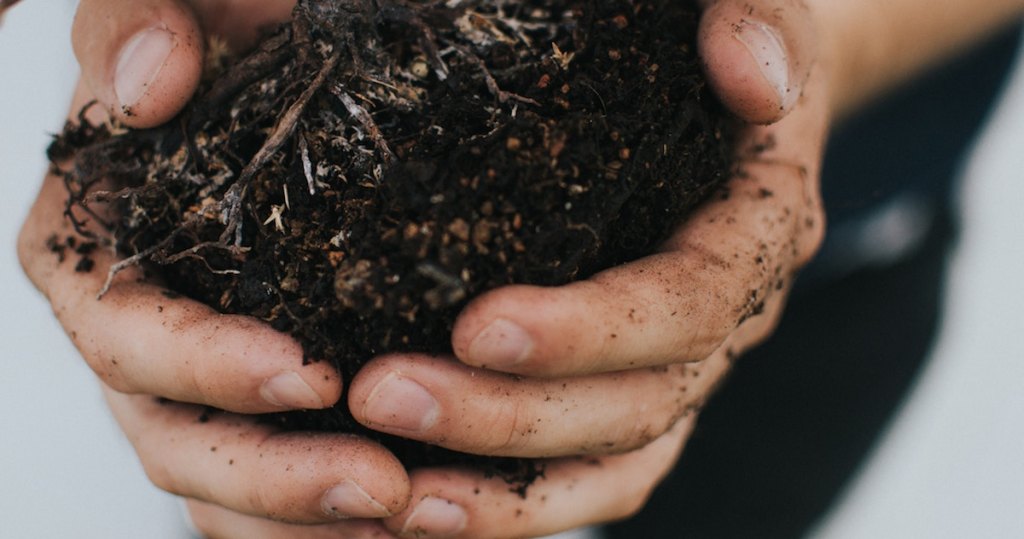
Because most nurseries plant their succulents in soil that is too rich and retains too much moisture, repotting your succulent from day one is crucial. Succulents need soil with lots of sand, pumice, and/or perlite. Look for a fast-draining cactus/succulent potting mix. Mix up to 50% desert sand into your potting soil to prevent compaction and overly dense soil.
Hip Tip: If planting your succulents outside, use the same type of soil and place your succulent in an area of your garden that rarely gets moisture.
6. What kind of planter should I use for my succulent?
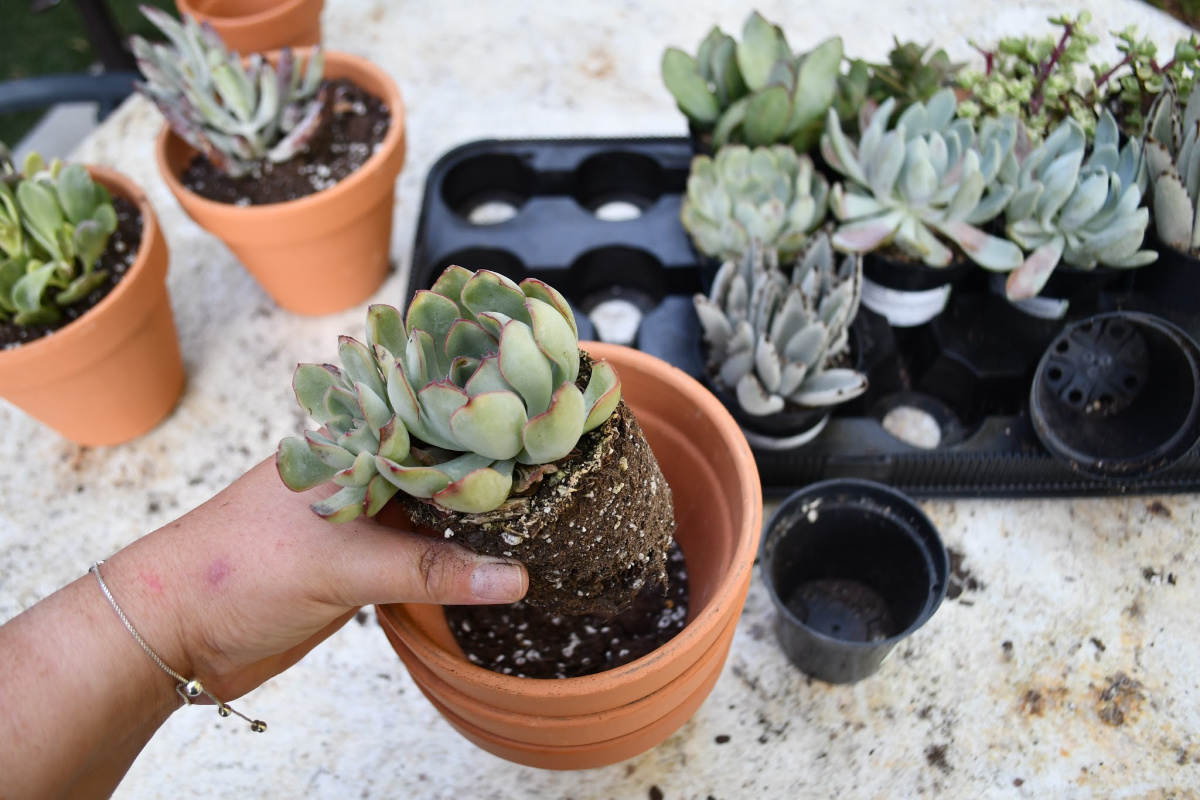
When you bring your succulent home, re-pot it in fresh soil. Make sure your container’s drainage hole is at least 1-2 inches larger than the nursery container it arrived in. To make the perfect home for your succulent, fill the bottom one-third of the container with your soil mixture, then position your plant inside and backfill with more soil mixture until the pot is full.
Hip Tip: While glass containers like mason jars and terrariums are really chic and fashionable, they’re not a great long-term potting solution for succulents. This is because they don’t allow the roots to breathe and can cause root rot over time.
Check out these cute little succulent pots that come with their own bamboo trays, or try these adorable owl planters.
7. How much light does my succulent need?
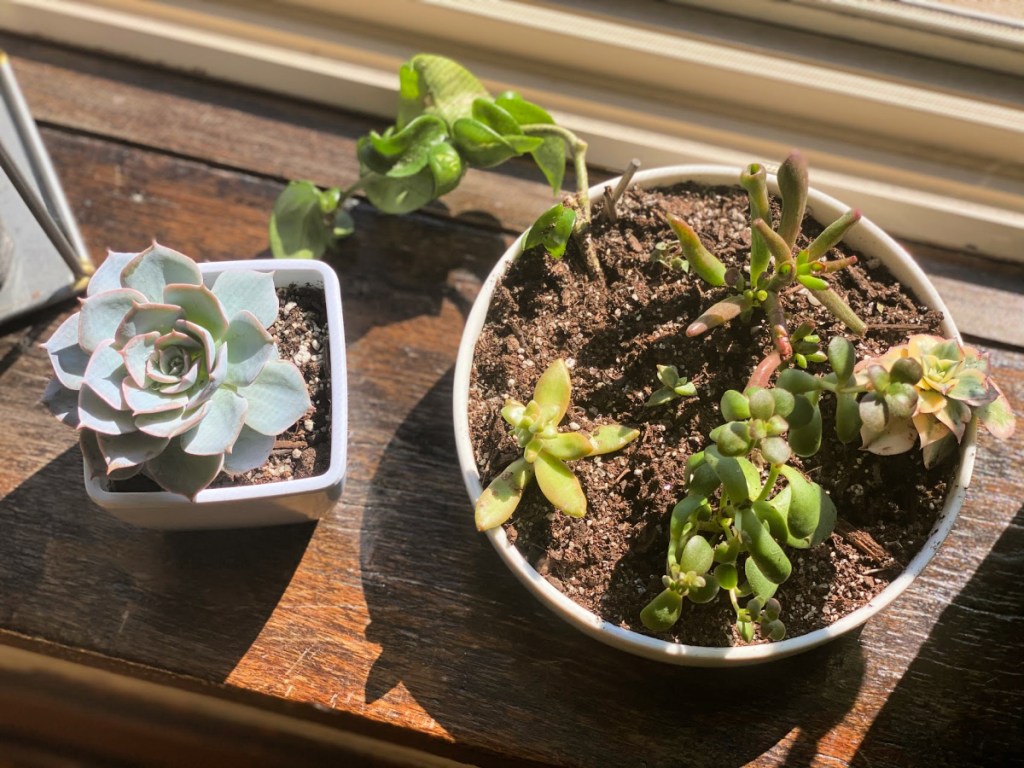
Most succulents need at least 4 to 6 hours of sunlight per day. For indoor succulents, the most ideal places in your home are near a window that faces south or east since those have the most sunlight on average. Avoid north-facing windows or shady corners that will be too dark. For succulents planted outdoors, keep them in filtered light under a tree or other shade screen.
Signs your plants aren’t getting the right amount of light:
- Too little light makes succulents lean into sunlight or get lanky and sparse.
- Too much light may cause plants to turn yellow, orange, or even red.
Hip Tip: If you’ve accidentally placed your succulent in poor lighting and need to move it into a brighter location, be cautious. Suddenly moving your plant into bright sunlight can roast it. Gradually move your succulent from shade to sun one phase at a time for best results. (Varieties most at risk for sun damage include solid green, pale, or variegated succulents.)
8. How much water does my succulent need?
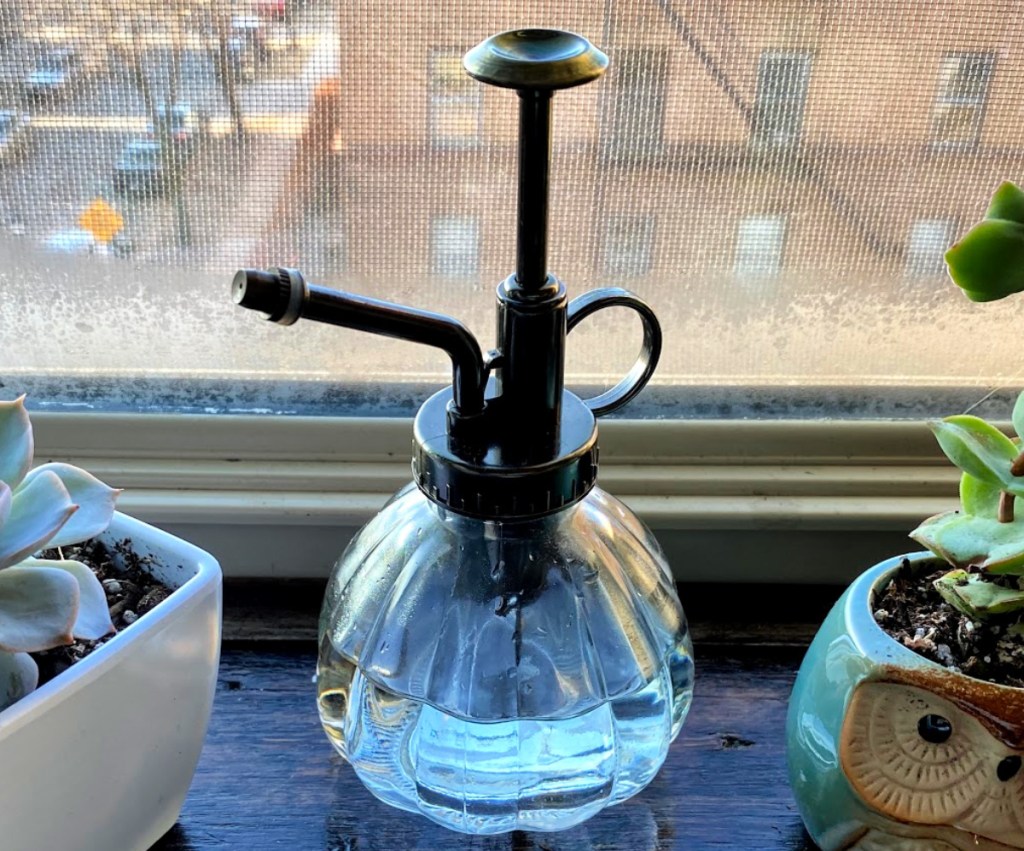
If you’re the kind of person who always forgets to water your plants, succulents are probably perfect for you! The top mistake many people make with succulents (and many plants in general) is overwatering them.
Water indoor succulents every 10-14 days and outdoor succulents every 7-10 days.
- For young/small succulents: Spritz soil with water every 6-10 days. I use this adorable vintage-style spray bottle.
- For larger, more established succulents: Saturate the soil completely (enough that the water flows from the pot’s drainage hole.)
The next time you water will depend on the soil. If the soil hasn’t had the proper time to dry out completely since your last watering, wait and continue checking until it feels completely dry before watering again.
If you water your plant too much, some of its leaves may look see-through or feel mushy. If you water it too little, its leaves will start to look wrinkly or pruney.
9. How often should I fertilize my succulent?
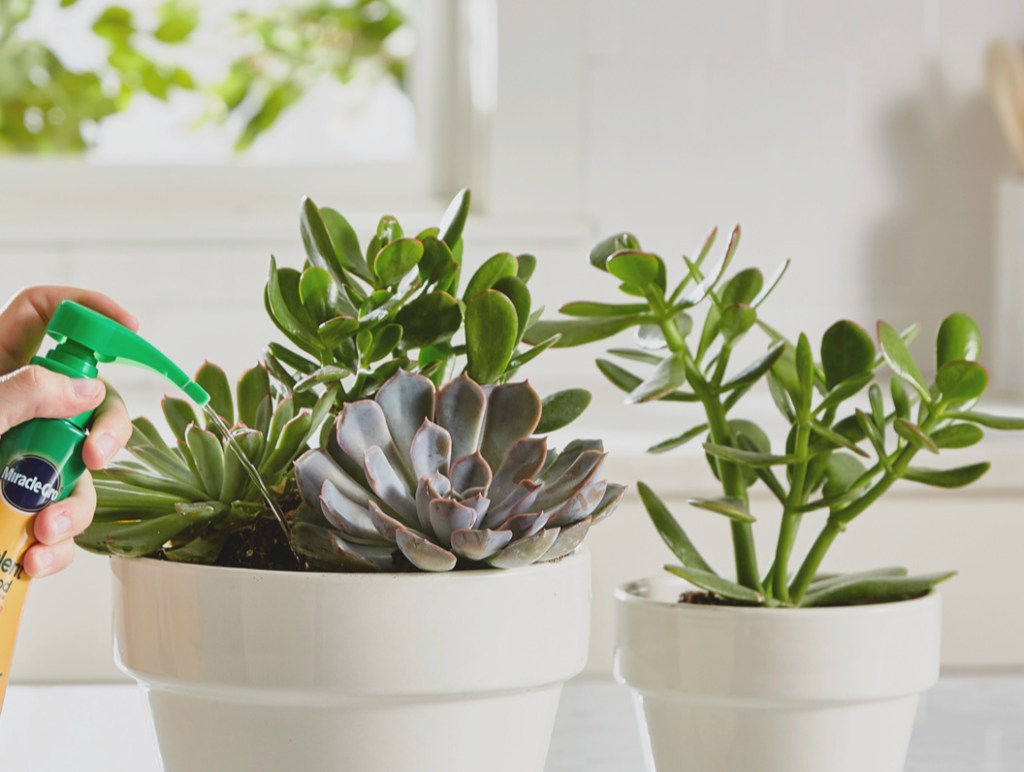
Over time, soil loses the nutrients it provides to the plant. Therefore, they’ll need to be fertilized and occasionally re-potted.
Succulents should be fertilized once or twice per year for the best results. Since succulents generally go dormant in the winter, they’ll benefit from spring fertilization when new growth is ready to begin.
Hip Tip: Experts recommend using a balanced, all-purpose, water-soluble fertilizer (like 8-8-8 or 10-10-10) diluted to half the strength recommended on the package instructions. You could also use Miracle-Gro Succulent Plant Food.
10. Why are the leaves falling off of my succulent?
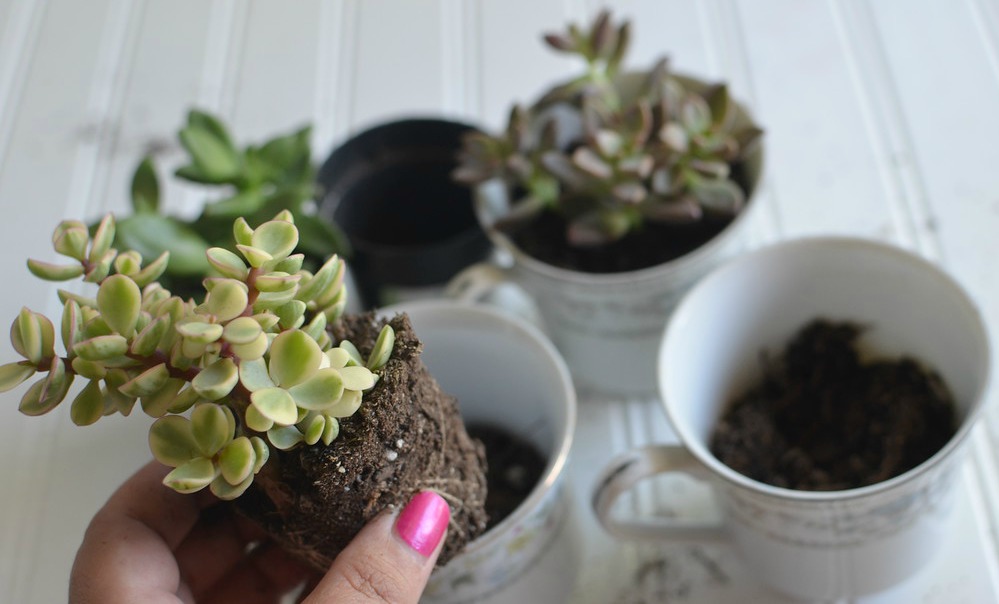
Something many inexperienced succulent owners may experience is the loss of lower plant limbs. This often makes people feel like they’re doing something wrong or that their plant is dying. This is not normally the case!
Like many live plants, the lower leaves (i.e., the ones closest to the potting mix), will eventually shrivel up and fall off. This is normal and nothing to worry about! The only time you should worry is if the upper leaves are dying, which could symbolize a few different things (overwatering, pests, or disease).
What if a healthy leaf breaks off?
Sometimes a plant gets bumped and a leaf breaks off, but don’t throw it out! You can grow a completely new plant from a healthy leaf.
Just fill a little pot or tray with sandy soil or even gravel and lay the leaf flat on top. Water about three times a week by misting with a spray bottle, and wait. It can take a couple of months before you see anything, but eventually, you’ll get a teeny-tiny version of the original plant!
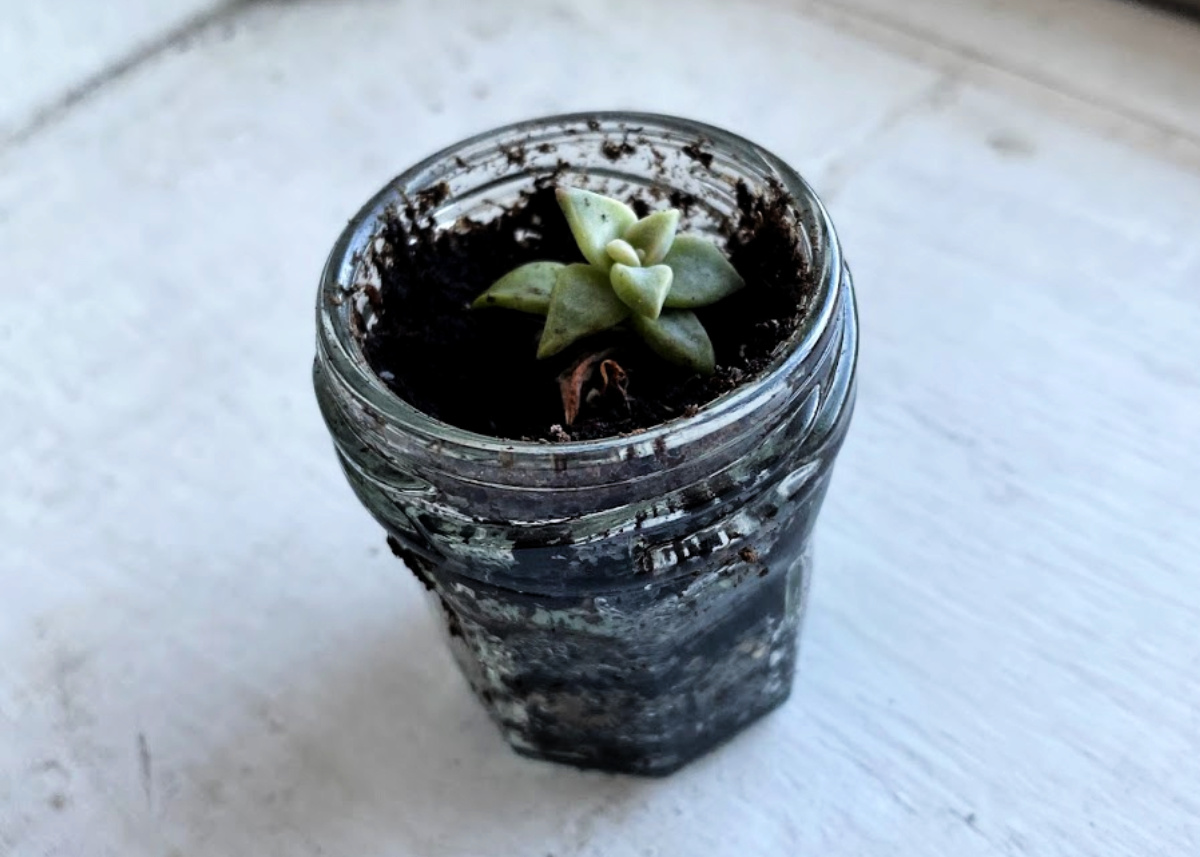
(This little guy is going to be transplanted to a more breathable terra-cotta pot soon!)
11. Where can I buy succulents?
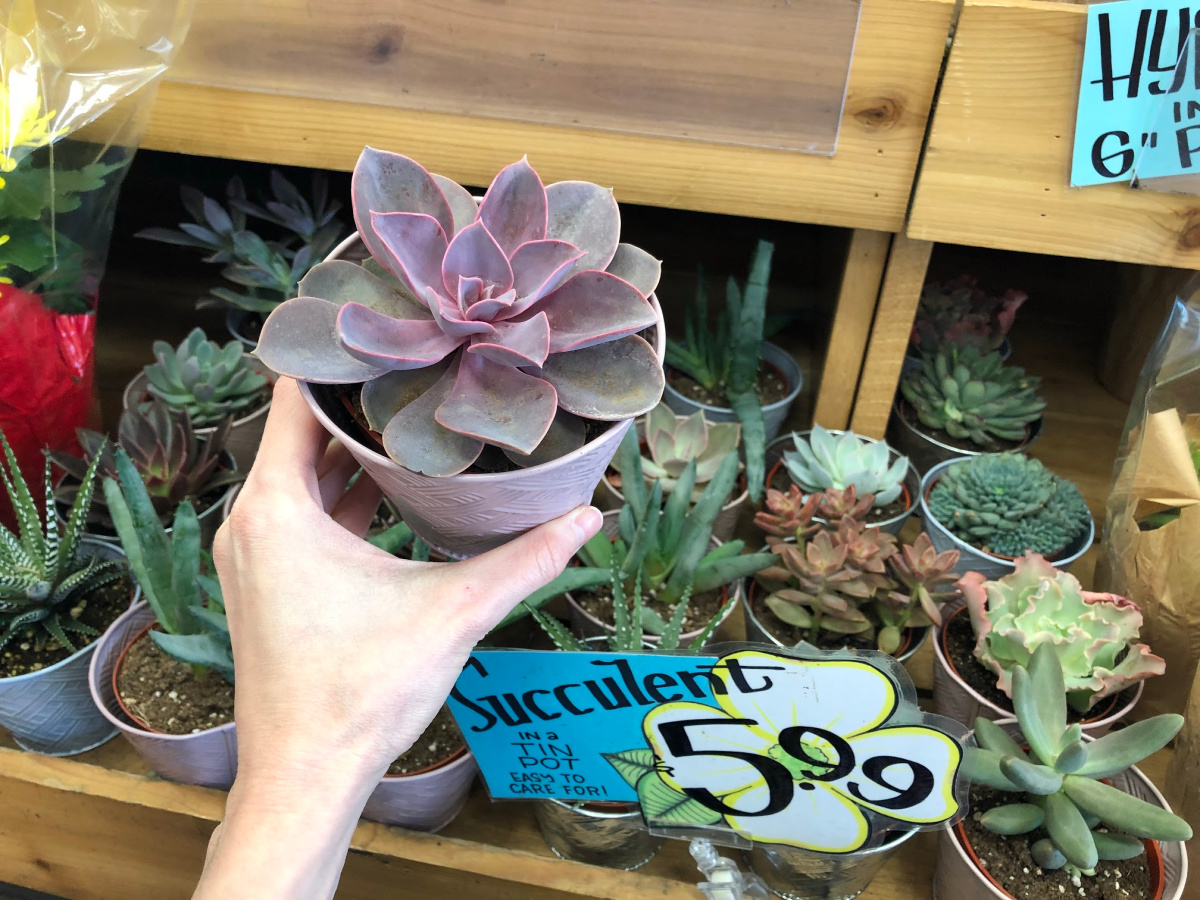
Succulents are so popular right now that you can find them anywhere! We even have the scoop on where to find gorgeous faux succulents for our non-gardening friends.
My favorite places to buy live succulents:
ONLINE
- Fat Plants San Diego – This California-licensed nursery and grower guarantees fully rooted plants and always has a great variety.
- Costa Farms – These highly-rated plants come carefully packed, are shipped with care, and arrive looking every bit as good as the pictures!
- The Home Depot – A tried and true home improvement store that always has a great selection of succulent species.
- Amazon – You read that right! I’ve gotten succulents, air plants, and more online, like this 5-pack of starter succulents for under $20!
IN-STORE
- IKEA – Check the lower level for lots of great deals on succulents!
- Trader Joe’s – TJ’s isn’t just a great place to get cut flowers—they sell affordable succulents and other small potted plants, too.
My favorite places to buy faux succulents:
- Crate and Barrel These come in clean, modern pots and are hand-“planted” for extra realism.
- Hobby Lobby These cheery little pops of nature give you a natural look without any care or maintenance.
- Target These come in ceramic planters to make your plants look expensive.
Looking for the best places to buy potted plants online?
12. Why isn’t my succulent growing?
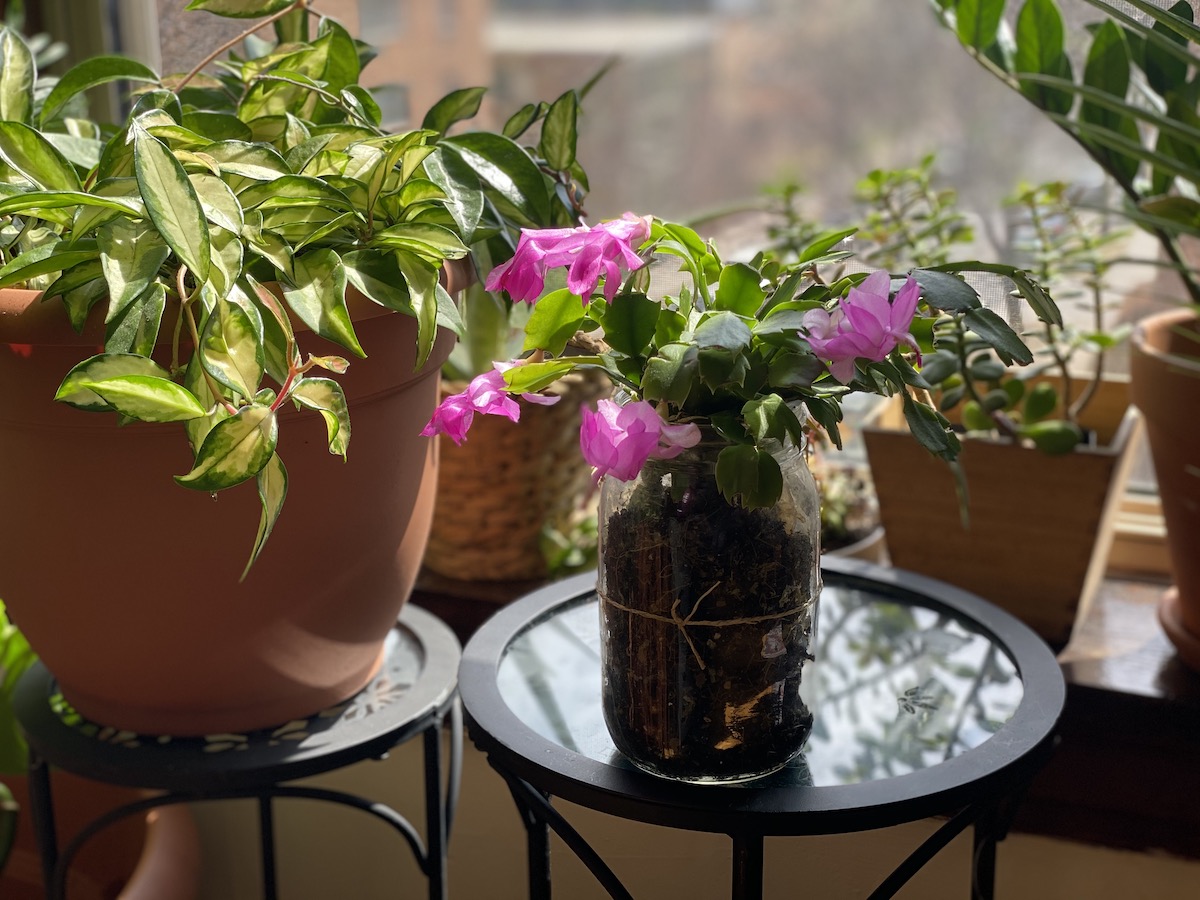
Finding the sweet spot with succulents takes a little trial and error. These tips and tricks are the best place to start, and most succulents have a pretty strong will to live!
Take the Christmas cactus of mine above. I got it for $5 at Aldi in December 2017, and it’s survived my amateur gardening attempts, three apartment moves, being transplanted to a mason jar (not usually good for succulents & cacti, but it seems happy there!), and being blown off my fourth-story balcony during a storm last summer. It even bloomed this week!
Once you’ve mastered succulent care for beginners, build this gorgeous DIY hanging succulent wall! 😍

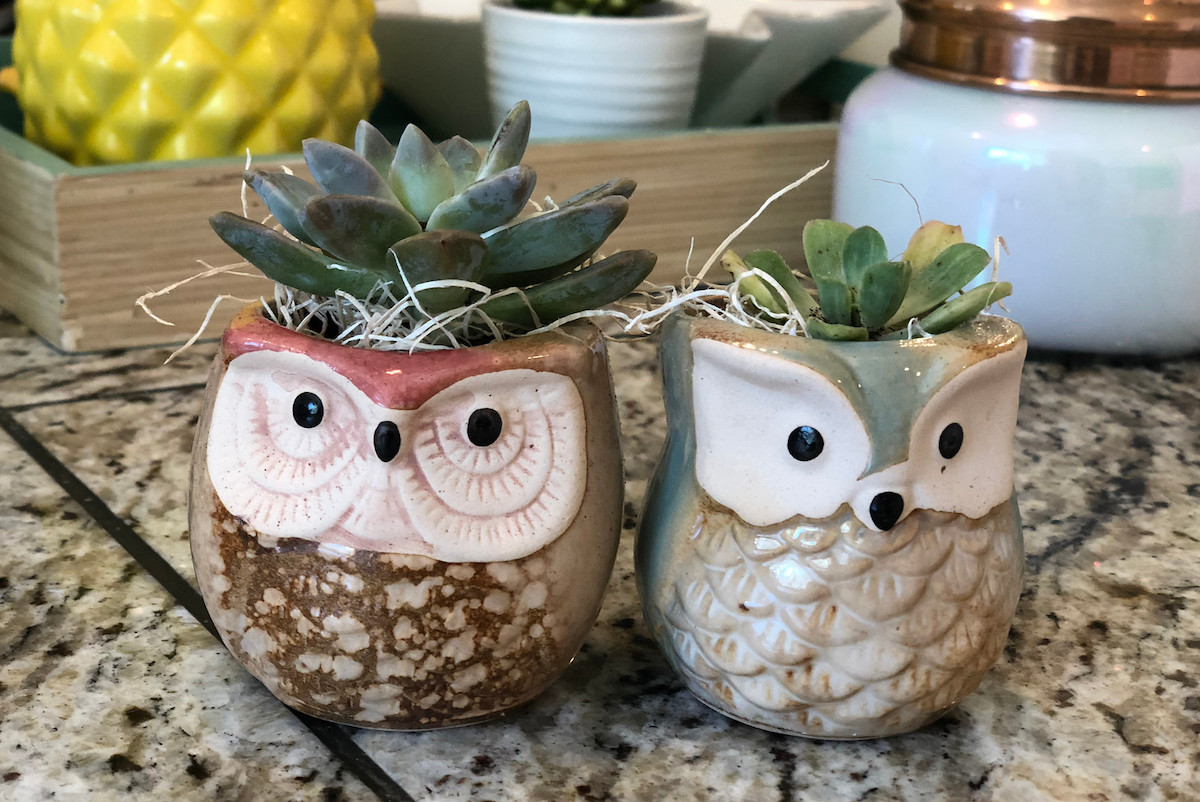
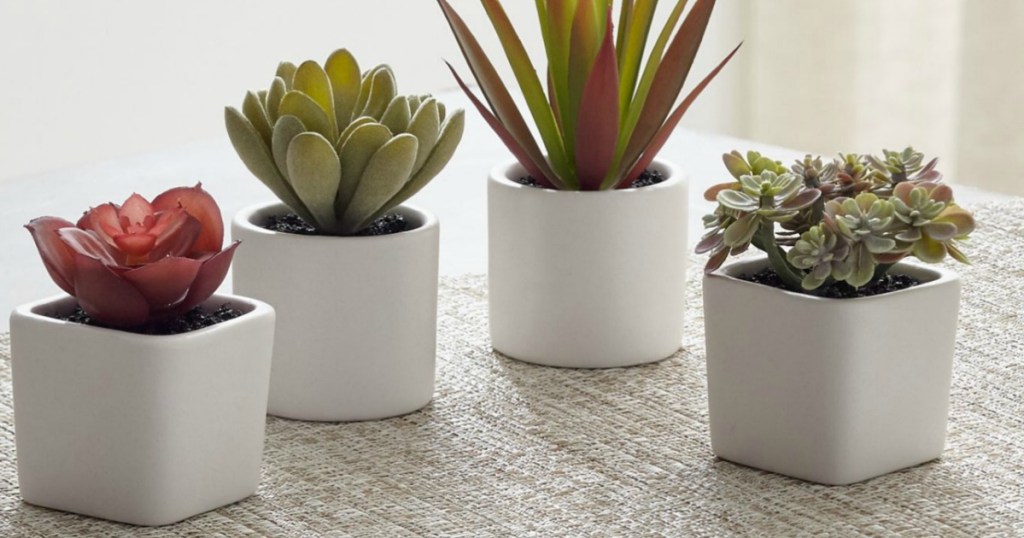
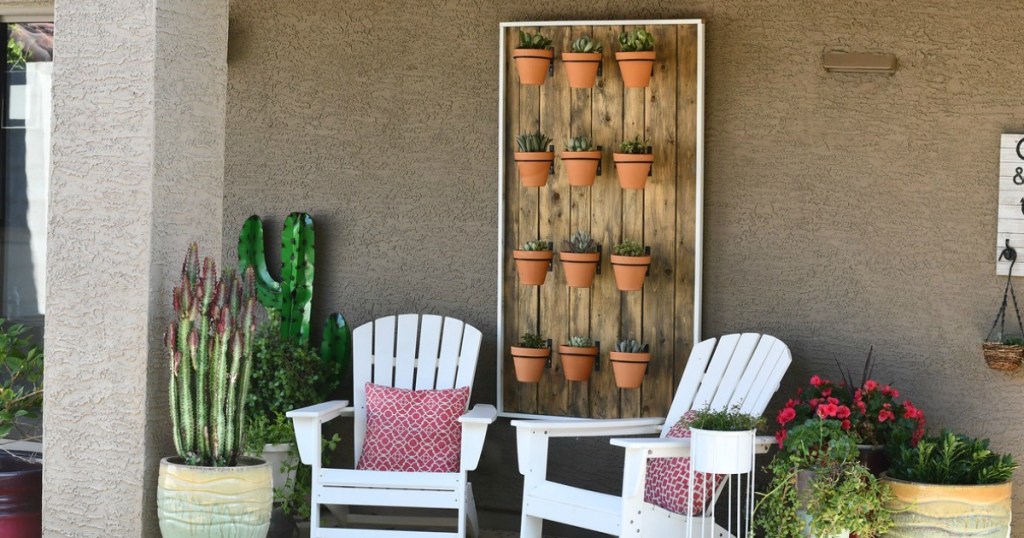



There are even succulent subscription boxes, too! Personally, I think a subscription would make a great mother’s day gift.
SO true! Thanks so much for the reminder! https://hip2save-com-develop.go-vip.co/deals/succulent-studios/
First off, I have a degree in greenhouse management and grew succulents for a living.
The main thing people get wrong is watering. If you’re talking about succulents, the easiest way to tell when it needs water is to lightly pinch the leaves. If its firm, that means its full of water and does not need any more. If there is some give to the leave, then water it. Succulents are native to environments where they only receive rainfall sporadically. You soil is will dry for a long time before your plant needs more water. Once you get the hang of it, growing succulents is a lot of fun!
Thanks so much for sharing these tips with us, Bill! SO helpful!
I successfully killed one 😂😭, and it didn’t take too long. The other two are still alive and one of them has bloomed to double
Good job on the other two and since one doubled that makes up for the one that didn’t survive, right?